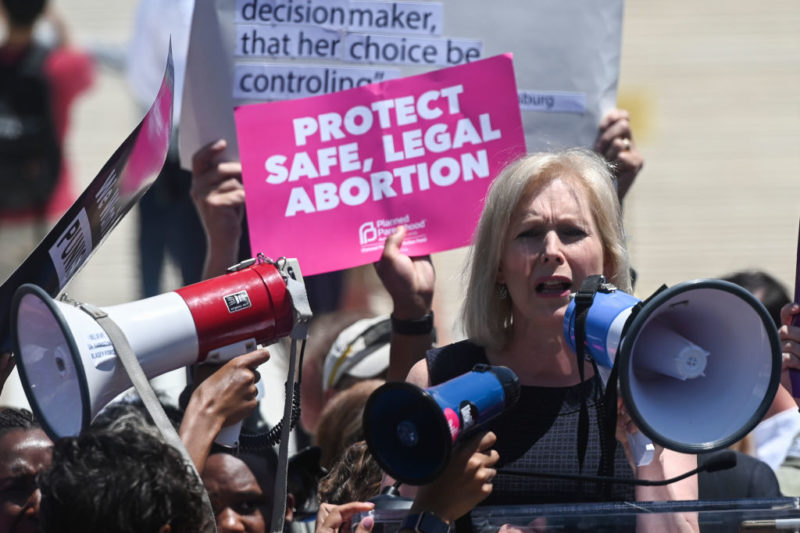How Congress Can Immediately Seize on Monday’s Abortion Rights Win
The Women's Health Protection Act would protect abortion access from bans and burdensome restrictions.

For full coverage of June Medical Services v. Russo, check out our Special Report.
Many of us had been nervously anticipating this moment. On Monday, the U.S. Supreme Court handed down a 5-4 decision on abortion rights, striking down a highly restrictive Louisiana law intended to shut down abortion clinics in the state. This outcome is a big relief, and an important win for the people of Louisiana.
Justice Breyer’s opinion is a rewarding read for anyone who cares about facts and evidence. It refutes false claims by the anti-abortion politicians and activists that had imposed this law, calling them out on the fact that this restriction has no benefits for patient health and only served to shut down clinics in Louisiana.
So let’s celebrate, and offer our thanks and gratitude to the Louisiana abortion providers and their allies who took this case to the Supreme Court and earned this major victory.
At the same time, we should not be under any illusion that the future of abortion rights is secure. Decades of history and evidence, including the more than 1,200 restrictions states have enacted since the Roe v. Wade decision in 1973, leave no doubt about the lengths to which anti-abortion activists will go to push their coercive agenda. The result: Our experts at the Guttmacher Institute classify 29 states as “hostile” to abortion rights based on the large number of restrictions they have enacted, with almost six out of every ten U.S. women of reproductive age (or 40 million) living in one of these states.
Every day, these policies stand between pregnant people and the abortion care they seek. For instance, the average one-way driving distance to an abortion clinic for a woman of reproductive age in Louisiana is 41 miles. While attempts to shut down the remaining clinics in the state have failed, at least for now, it’s chilling to know that the average distance would increase to 172 miles (or more than four times as far) if patients were forced to travel out-of-state to get to the nearest abortion clinic.
Even in the absence of a pandemic, the thicket of abortion restrictions means many abortion patients struggle to get the care they need. This includes navigating intentionally burdensome requirements that serve no medical purpose, as well as coming up with the money to pay for the procedure. These difficulties—taking time off work, securing childcare, finding the money to pay for all of this—is compounded when restrictions lead to clinic closures and women are forced to travel longer distances, or even have to go to a neighboring state.
That’s why abortion restrictions are a fundamental violation of human rights. And these coercive policies disproportionately harm Black and brown communities that face overlapping oppressive policies and structural racism.
The onslaught of restrictions needs to stop. Abortion is essential, time-sensitive health care. When someone decides to get an abortion they should be able to get affordable, accessible, and compassionate care.
It’s on all of us to make this right a reality for all—and many have already take action. Last year, nine states took major steps to repeal restrictions or to protect and expand access, while governors in another five states vetoed abortion restrictions passed by the state legislature. More states should follow suit, and we have laid out a host of ways they can do so. This includes affirming the right to abortion, providing insurance coverage for abortion care, expanding online and telehealth access, and promoting policies and practices that support individuals who self-manage their abortions.
States stepping up is critical, but not all states will do so, and abortion access should not depend on your ZIP code. That’s why we need federal action to restore and protect access to abortion across the whole country—and Congress has the tools it needs at its fingertips. The Women’s Health Protection Act is a federal bill that would protect abortion access from bans and burdensome restrictions like the Louisiana admitting privileges law.
Congress must also take action to ensure people can afford the care they need by repealing the discriminatory Hyde Amendment and related restrictions. Restoring insurance coverage of abortion for everyone insured through Medicaid and other federal programs is a critical step toward dismantling structural barriers and systemic racism with respect to access to abortion care.
In many ways, 2020 is a clarifying moment, where all of us are called upon to stand against injustice, racism, and sexist oppression. So even as we celebrate that the Supreme Court struck down Louisiana’s terrible law, we must not let down our guard. It will take every one of us to carry forward the fight for reproductive freedom and bodily autonomy for all.
